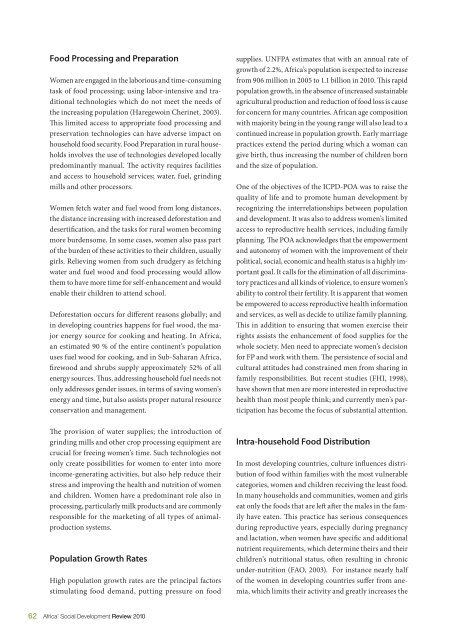The African Social Development Review - United Nations Economic ...
The African Social Development Review - United Nations Economic ...
The African Social Development Review - United Nations Economic ...
Create successful ePaper yourself
Turn your PDF publications into a flip-book with our unique Google optimized e-Paper software.
Food Processing and PreparationWomen are engaged in the laborious and time-consumingtask of food processing; using labor-intensive and traditionaltechnologies which do not meet the needs ofthe increasing population (Haregewoin Cherinet, 2003).This limited access to appropriate food processing andpreservation technologies can have adverse impact onhousehold food security. Food Preparation in rural householdsinvolves the use of technologies developed locallypredominantly manual. <strong>The</strong> activity requires facilitiesand access to household services; water, fuel, grindingmills and other processors.Women fetch water and fuel wood from long distances,the distance increasing with increased deforestation anddesertification, and the tasks for rural women becomingmore burdensome. In some cases, women also pass partof the burden of these activities to their children, usuallygirls. Relieving women from such drudgery as fetchingwater and fuel wood and food processing would allowthem to have more time for self-enhancement and wouldenable their children to attend school.Deforestation occurs for different reasons globally; andin developing countries happens for fuel wood, the majorenergy source for cooking and heating. In Africa,an estimated 90 % of the entire continent’s populationuses fuel wood for cooking, and in Sub-Saharan Africa,firewood and shrubs supply approximately 52% of allenergy sources. Thus, addressing household fuel needs notonly addresses gender issues, in terms of saving women’senergy and time, but also assists proper natural resourceconservation and management.<strong>The</strong> provision of water supplies; the introduction ofgrinding mills and other crop processing equipment arecrucial for freeing women’s time. Such technologies notonly create possibilities for women to enter into moreincome-generating activities, but also help reduce theirstress and improving the health and nutrition of womenand children. Women have a predominant role also inprocessing, particularly milk products and are commonlyresponsible for the marketing of all types of animalproductionsystems.Population Growth RatesHigh population growth rates are the principal factorsstimulating food demand, putting pressure on foodsupplies. UNFPA estimates that with an annual rate ofgrowth of 2.2%, Africa’s population is expected to increasefrom 906 million in 2005 to 1.1 billion in 2010. This rapidpopulation growth, in the absence of increased sustainableagricultural production and reduction of food loss is causefor concern for many countries. <strong>African</strong> age compositionwith majority being in the young range will also lead to acontinued increase in population growth. Early marriagepractices extend the period during which a woman cangive birth, thus increasing the number of children bornand the size of population.One of the objectives of the ICPD-POA was to raise thequality of life and to promote human development byrecognizing the interrelationships between populationand development. It was also to address women’s limitedaccess to reproductive health services, including familyplanning. <strong>The</strong> POA acknowledges that the empowermentand autonomy of women with the improvement of theirpolitical, social, economic and health status is a highly importantgoal. It calls for the elimination of all discriminatorypractices and all kinds of violence, to ensure women’sability to control their fertility. It is apparent that womenbe empowered to access reproductive health informationand services, as well as decide to utilize family planning.This in addition to ensuring that women exercise theirrights assists the enhancement of food supplies for thewhole society. Men need to appreciate women’s decisionfor FP and work with them. <strong>The</strong> persistence of social andcultural attitudes had constrained men from sharing infamily responsibilities. But recent studies (FHI, 1998),have shown that men are more interested in reproductivehealth than most people think; and currently men’s participationhas become the focus of substantial attention.Intra-household Food DistributionIn most developing countries, culture influences distributionof food within families with the most vulnerablecategories, women and children receiving the least food.In many households and communities, women and girlseat only the foods that are left after the males in the familyhave eaten. This practice has serious consequencesduring reproductive years, especially during pregnancyand lactation, when women have specific and additionalnutrient requirements, which determine theirs and theirchildren’s nutritional status, often resulting in chronicunder-nutrition (FAO, 2003). For instance nearly halfof the women in developing countries suffer from anemia,which limits their activity and greatly increases the62 Africa’ <strong>Social</strong> <strong>Development</strong> <strong>Review</strong> 2010
















